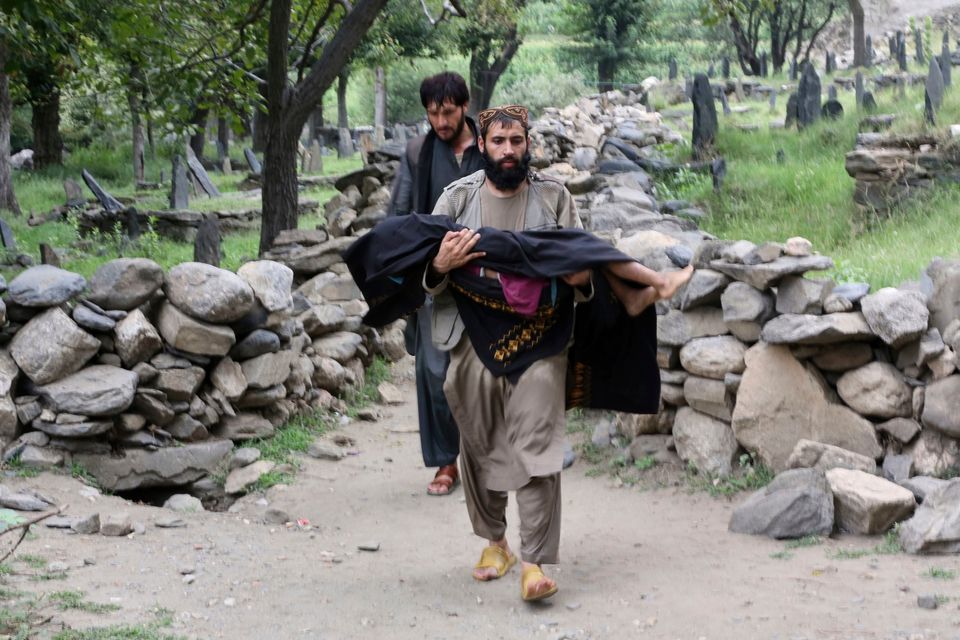World
Afghanistan Earthquake Claims Over 800 Lives, Urgent Aid Needed

A powerful earthquake struck Afghanistan late on March 11, 2024, resulting in over 800 fatalities and injuring at least 2,800 people. The magnitude 6 quake, occurring at a depth of 10 kilometers (6 miles), primarily affected the eastern provinces of Kunar and Nangarhar. Rescue efforts are hampered by challenging terrain and inclement weather, complicating the Taliban administration’s response to this disaster.
Authorities report that the earthquake killed 812 individuals in Kunar and 12 in Nangarhar, according to Zabihullah Mujahid, a spokesperson for the Taliban. The region has a history of seismic activity, and the current disaster adds to the multitude of challenges facing Afghanistan, which is already grappling with limited resources and international isolation.
Sharafat Zaman, spokesperson for the health ministry, emphasized the need for international assistance in the wake of the disaster. “We need it because here lots of people lost their lives and houses,” Zaman stated in an interview with Reuters.
Rescue Operations Underway
Rescue teams are working tirelessly to reach remote mountainous areas that have been cut off from communication networks. The tremors caused extensive damage to the mudbrick homes in these regions. Kate Carey from the United Nations Office for the Coordination of Humanitarian Affairs (UNOCHA) noted that heavy rainfall in the days leading up to the quake has increased the risk of landslides, making many roads impassable. “The area of the earthquake was affected by heavy rain in the last 24-48 hours as well, so the risk of landslides and rock slides is also quite significant,” Carey explained.
As rescue operations continue, the casualty figures may rise, with efforts focused on accessing isolated locations. “All our teams have been mobilised to accelerate assistance, so that comprehensive and full support can be provided,” said health ministry spokesperson Abdul Maten Qanee. The military is also involved in rescue efforts, conducting airlifts to transport the injured. Recent reports indicate that 40 helicopter flights have evacuated over 420 individuals from the affected areas.
Survivors are faced with significant challenges, with many villages completely destroyed. One resident from Mazar Dara in Nurgal district lamented, “The entire village has been destroyed. Children and elders are trapped under the rubble. We need urgent help.” Another survivor urgently called for ambulances and medical assistance, stating, “We need everything to rescue the injured and recover the dead.”
International Response and Humanitarian Crisis
The earthquake marks Afghanistan’s third major seismic disaster since the Taliban regained control in 2021. The country’s humanitarian situation has been dire, exacerbated by a steep decline in foreign aid, which has plummeted from $3.8 billion in 2022 to just $767 million this year. This reduction in funding is largely attributed to international frustration over the Taliban’s treatment of women, including restrictions on female aid workers.
Despite the urgent need for assistance, no foreign government had reached out to offer support for rescue or relief efforts as of Monday. However, a spokesperson for China’s foreign ministry confirmed that it is prepared to provide disaster relief assistance “according to Afghanistan’s needs and within its capacity.” Meanwhile, India has already dispatched 1,000 family tents to Kabul and is moving 15 tonnes of food to Kunar.
In a statement on social media, the U.S. State Department expressed condolences for the lives lost in the earthquake but did not announce any immediate plans for assistance. The humanitarian crisis in Afghanistan has become increasingly critical, with the United Nations estimating that over half of the population requires urgent aid.
U.N. Secretary-General Antonio Guterres mentioned that the organization’s mission in Afghanistan is preparing to assist those affected by the earthquake. As the country faces these compounded challenges, the international community’s response will be crucial in providing relief and support to those in dire need.
-

 Top Stories2 months ago
Top Stories2 months agoTributes Surge for 9-Year-Old Leon Briody After Cancer Battle
-

 Entertainment3 months ago
Entertainment3 months agoAimee Osbourne Joins Family for Emotional Tribute to Ozzy
-

 Politics3 months ago
Politics3 months agoDanny Healy-Rae Considers Complaint After Altercation with Garda
-

 Top Stories3 months ago
Top Stories3 months agoIreland Enjoys Summer Heat as Hurricane Erin Approaches Atlantic
-

 World4 months ago
World4 months agoHawaii Commemorates 80 Years Since Hiroshima Bombing with Ceremony
-

 Top Stories2 months ago
Top Stories2 months agoNewcastle West Woman Patricia Foley Found Safe After Urgent Search
-

 Top Stories4 months ago
Top Stories4 months agoFianna Fáil TDs Urgently Consider Maire Geoghegan-Quinn for Presidency
-

 World4 months ago
World4 months agoGaza Aid Distribution Tragedy: 20 Killed Amid Ongoing Violence
-

 World4 months ago
World4 months agoCouple Convicted of Murdering Two-Year-Old Grandson in Wales
-

 Top Stories3 months ago
Top Stories3 months agoClimbing Errigal: A Must-Do Summer Adventure in Donegal
-

 World4 months ago
World4 months agoAristocrat Constance Marten and Partner Convicted of Infant Murder
-

 Top Stories3 months ago
Top Stories3 months agoHike Donegal’s Errigal Mountain NOW for Unforgettable Summer Views









